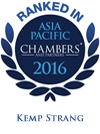All Australian merchants (other than the taxi industry) are now prohibited from charging excessive surcharges for accepting certain payment methods.
While 'large' merchants became subject to the Reserve Bank of Australia's Standard No 3 Scheme Rules Relating to Merchant Pricing for Credit, Debit and Prepaid Card Transactions (the Standard) on 1 September 2016, from 1 September 2017 all merchants that accept payment by a card which is part of the Visa Debit, Visa Prepaid, Debit Mastercard, Mastercard Prepayment, Eftpos System, Eftpos prepaid or American Express Companion Card schemes (a Card Scheme and a card which is subject to a Card Scheme a Card) became subject to the Standard.
A 'large' merchant is a merchant that satisfies two of the following criteria:
- consolidated gross revenue of $25m or more during a financial year;
- consolidated gross assets of $12.5m or more; and
- the merchant and its related body corporates employ 50 or more employees between them.
If you're a merchant and you haven't calculated how you arrived at the amount of the surcharge that you apply when you accept payment by a Card, the time to do the math is now.
Surcharges
When a merchant accepts payment by certain payment methods, it may come at a cost to the merchant. So that the merchant does not carry that cost, it may apply a surcharge which, effectively, passes the cost back to the customer; oftentimes the cost of the surcharge is built into the cost of the item or there is a notice at the point of sale. Some merchants elect not to apply a surcharge but incorporate payment costs into the overall price of items.
The Standard
Under the Standard, the amount of the surcharge that a merchant may charge when it accepts payment by a Card is limited to its 'Cost of Acceptance'.
A merchant's 'Cost of Acceptance' is calculated as being the average cost paid by that merchant (after taking into account any discounts, rebates or other allowances) for a Card transaction during a particular 12 month reference period due to:
- merchant service fees;
- terminal rental fees;
- fraud prevention services;
- gateway or fraud prevention services;
- fees paid to the merchant's acquirer or payment facilitator in processing transactions using a Card, including cross border fees; and
- fees or charges paid by the merchant to a person (not being a related body corporate of the merchant) on account of forward delivery risk.
Each of the above fees and costs must be directly related to Card transactions in the particular Card Scheme and be determined by reference to:
- a contract between the merchant and its acquirer, payment facilitator or payment service provider; or
- an invoice from the merchant's acquirer, payment facilitator or payment service provider
Penalties
If a merchant is found to be charging a surcharge which does not comply can with the Standard, the Australian Competition and Consumer Commission (ACCC) may, among other actions, issue an infringement notice imposing a penalty of:
- 600 penalty units ($126,000.00) for listed companies;
- 60 penalty units ($12,600,00) for a body corporate; or
- 12 penalty units ($2,520.00) for a person other than a body
corporate,
for each non-compliance.
Issues for Merchants
Of course, a merchant can elect not to apply a surcharge and build payment costs into overall prices. However, hopefully, those merchants that impose surcharges have done their costings before now and have determined the appropriate surcharge rates for Cards and are applying those rates. If not, it's time to do the math.
For those merchants that do apply a surcharge:
- you will need to keep accurate records to substantiate how the amount of the surcharge that you charge was determined, as the ACCC has the power to issue surcharge information notices and require that information evidencing actual costs incurred to be provided.
- you need to be aware that you will need to revisit your surcharge calculations each year.
The content of this article is intended to provide a general guide to the subject matter. Specialist advice should be sought about your specific circumstances.




